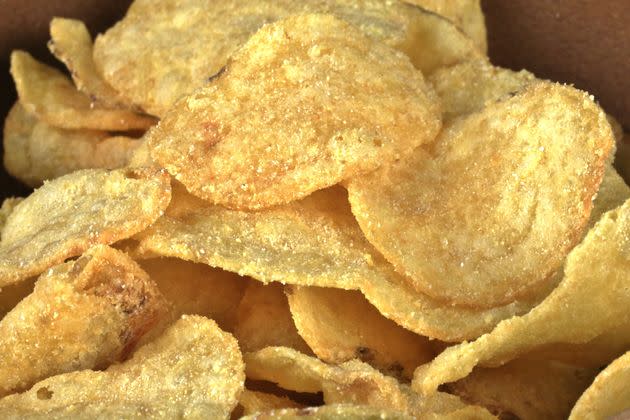Here's What 'Kettle Crisps' Really Stands For, And I Feel Stupid For Not Realising This Sooner

We’ve written before at HuffPost UK about why Hobnobs are called what they are.
We’ve even covered the complicated origins of the name Smarties ― and yep, one US brand did call their sweets that because they believed the candy would make their consumers smarter.
But what about kettle chips, the shattering sensation I feel took over Britain’s “nice little nibbles” industrial complex in about 2010?
Why are the crunchier, thicker, and respectfully, posher-feeling offerings “kettle,” while the regular sort must remain untitled?
It’s to do with how they’re cooked
Despite my misconception ― that “kettle” just meant “pricier” ― it turns out that the name refers to how thicker, crunchier crisps are cooked.
“The term kettle cooked refers to the vessel in which the chips [crisps] are fried,” food site Sporked revealed. They shared that throughout crisp history (crisptory?), people would finely slice spuds, fry ’em in oil, take them out when they were done, and begin another batch.
The container which holds the oil they’re cooked in is called a “kettle.”
That means crisps always used to take longer to cook than industrially-produced ones do, as the temperature of the oil drops every time you take an old batch of potatoes out.
The longer they’re left in the oil, the slower they cook, and the starches have longer to break down and become crunchier.
In order to keep crisp factories running at a fast pace, some companies don’t cook regular crisps in batches ― instead, they use what’s called “continuous processing,” which involves dipping or showering the slices in consistently-hot oil for a couple of minutes rather than cooking them in a “kettle.”
A Science Direct article shows a diagram of a machine with a hot oil river at its base and windmill-like paddles which lift the product into and out of the fat.
Huh!
Right! So despite my thinking kettle chips only became “a thing” after the naughties, they’re actually the old-school way to do things.
There is, of course, also a company called Kettle which makes chips the old-school way, and they account for 40% of the fancy crisp market in the UK.
But were I to take it back to my teenaged hungover habit of finely slicing some spuds, chucking them in the deep fat fryer, and dusting them with the contents of noodle packets (don’t knock it ’til you try it) ― yup, those are pretty close to being kettle crisps, too.

